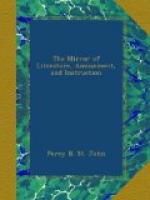eventful times in which Erasmus flourished, opening
to my mind’s eye a long vista of historical recollections,
till my absorbed demeanour attracted observation.
I found myself exposed to that vacant stare with which
people are so apt to disconcert your composure, if
they observe you contemplating with curiosity and interest,
objects which they have seen every day of their lives,
and for that very reason always pass unnoticed.
Leaving then my position, yet anxious to follow up
the train of ideas it had inspired, I sought, and
by dint of inquiry, discovered the habitation of Erasmus.
It is in a dirty street, and consists of one moderately
sized, low roofed apartment, on the first floor of
an old fashioned, ill-built house, which the vicissitudes
of time have converted into an
Estaminet.[1]
I was conducted up a dark, narrow staircase into the
close, dingy room, by an ugly, ignorant frau, who seemed
to wonder what earthly inducement I had to visit her
dwelling-house. Lumber and moth-eaten furniture
were carelessly scattered around. A solitary window,
partly blocked up by an old mattress, barely admitted
light sufficient to make objects visible. All
was neglect and desolation. It seemed almost
impossible that so obscure and dismal a lodging could
have been occupied by so illustrious a tenant.
I fancied I beheld the most learned man of his age,
the counsellor and companion of princes, and the contemporary
and rival of Sir Thomas More, indulging his classical
reveries in this comfortless chamber, regardless of
its forlorn and squalid aspect. The charm was
omnipotent. Seated in an ancient leathern-bottomed
chair, my hostess, and the dust and darkness of the
place were overlooked or forgotten. The spirit
of the mighty dead seemed to hover around, as a sort
of
genius loci, rescuing the wretched tenement
from otherwise deserved oblivion, and making its very
dinginess venerable!
[1] A low resort, something
between a French cafe, and an English
pot-house.
On another occasion I recollect experiencing very
strikingly, the force of local impressions. It
was when visiting the apartments of Mary Queen of
Scots, in the palace of Holyrood. Recalling to
mind, with the enthusiasm of one of her warmest admirers,
every circumstance connected with the eventful history
of that unfortunate princess, it was impossible for
me not to feel penetrated with the deepest interest.
I traversed the very rooms in which she had sat, and
conversed, and passed her hours of peaceful privacy.
My fancy pictured that privacy rudely and brutally
invaded by Darnley and his ruffian associates, when
bent on the murder of the ill-fated Rizzio. I
mentally compared the circumstances of that deed of
blood, as related by historians, with the facilities
for committing it, afforded by the distribution of
apartments. They tallied exactly. There was
the little room in which sat the queen with her ladies
and the devoted secretary. Close to the door




